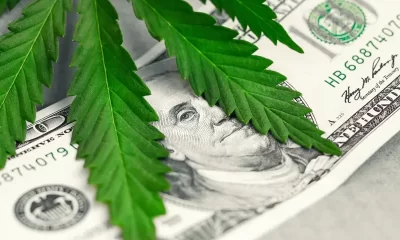Business
Here Are The Products That Drove Green Wednesday Sales (And The Ones That Tanked)

This year’s Green Wednesday was the third-highest grossing day of sales after 4/20 and the Friday before the 4th of July.
The joke about going for a walk with your cousin every Thanksgiving may be a thing of the past. With so many new forms of cannabis consumption, that “walk” to go smoke a joint with your cool cousin undetected could become Thanksgiving lore.
Beverages, edibles, and, in some cases, the convenient vape pen dominated Green Wednesday sales, as the day before Thanksgiving has come to be called.

Inflation also seemed to rear its ugly head this year. Sales transactions were up, but the amount customers spent was less. Data from both Headset and Jane Technologies demonstrate that Green Wednesday continues to be a winner for cannabis consumption.
Headset ran the numbers to see if Green Wednesday sales popped versus previous Wednesdays for dispensaries — and indeed they did. Combined sales data from California, Colorado, Massachusetts, Michigan, Nevada, Oregon, and Washington state saw sales jump by 48% compared with previous Wednesdays in November.
Headset also found that this year’s Green Wednesday was the third-highest grossing day of sales after 4/20 and the Friday before the 4th of July. Green Wednesday overtook Black Friday as the highest-grossing day during the Thanksgiving holiday stretch. In 2021, Green Wednesday saw a 61% increase in sales compared to a typical Wednesday.
As expected, sales fell on Thanksgiving Day as many dispensaries closed for the holiday, and Black Friday only experienced a slight increase of 1%. It looks as if consumers stocked up before heading out to relatives for the weekend.
Secret Stoners
Category Performance

The products that people could consume without Aunt Gertrude being any wiser grew. Headset noted that topicals (15.7%), beverages (13.2%), and edibles (6.1%) all experienced sales growth during the holiday stretch. Popular inhalable products, such as concentrates (-11.4%) and flower (-10.8%), took the biggest hit.
In Jane’s data, vape cartridges were the top-selling category, beating out flower by 20%. Vapes are easy to carry and not nearly as stinky as smoking flower.
Sales Lift
Jane Technologies looked at nationwide sales and in particular the new market of New Jersey. Jane found that Green Wednesday’s total sales increased by 77% compared to the previous four Wednesdays in a nationwide view. The average store saw sales increase by 20% over last year.
In New Jersey, sales increased by 100%. More mature markets saw sales fall or grow only slightly. California sales fell by 8%, Colorado fell by 7%, and Massachusetts dropped by 30%. Illinois’ Green Wednesday average store sales increased by 9%.
It seems consumers were on a budget this year. Transactions were up, but shopping carts weren’t full. Nationwide, Jane Technologies said that the average cart size fell by 8% from last year. In California, the cart size fell by 18%, in Colorado by 8%, Massachusetts carts fell by 17% and in Illinois, shoppers’ carts dropped by 14%.

Discounts
Headset noted that discounts increased across the board during the holiday stretch with the average discount increasing 7.3 percentage points to 21.8% across the three days of holidays.
While Green Wednesday was the largest sales day, it had the smallest average discount (19.8%), though an increase of nearly 6 percentage points from a typical Wednesday. Thanksgiving (22.2%) and Black Friday (23.7%) saw the largest average discounts both with an increase of more than 8 percentage points compared to a typical Thursday and Friday.
In Closing
Grabbing a beverage or munching an edible during the holiday may have replaced the annual walk with your cousin. It might lower the tensions that come with some family gatherings and even boost the munchies so that you can avoid insulting Granny by not eating that second piece of pie.
Ultimately, the cannabis industry, which has seen declining sales in some markets, must’ve been pleased to see customers pouring in on Wednesday. Let the holidays begin! And let’s keep that tradition of walking with your cousin — just bring them a gummy instead.
Business
New Mexico cannabis operator fined, loses license for alleged BioTrack fraud

New Mexico regulators fined a cannabis operator nearly $300,000 and revoked its license after the company allegedly created fake reports in the state’s traceability software.
The New Mexico Cannabis Control Division (CCD) accused marijuana manufacturer and retailer Golden Roots of 11 violations, according to Albuquerque Business First.
Golden Roots operates the The Cannabis Revolution Dispensary.
The majority of the violations are related to the Albuquerque company’s improper use of BioTrack, which has been New Mexico’s track-and-trace vendor since 2015.
The CCD alleges Golden Roots reported marijuana production only two months after it had received its vertically integrated license, according to Albuquerque Business First.
Because cannabis takes longer than two months to be cultivated, the CCD was suspicious of the report.
After inspecting the company’s premises, the CCD alleged Golden Roots reported cultivation, transportation and sales in BioTrack but wasn’t able to provide officers who inspected the site evidence that the operator was cultivating cannabis.
In April, the CCD revoked Golden Roots’ license and issued a $10,000 fine, according to the news outlet.
The company requested a hearing, which the regulator scheduled for Sept. 1.
At the hearing, the CCD testified that the company’s dried-cannabis weights in BioTrack were suspicious because they didn’t seem to accurately reflect how much weight marijuana loses as it dries.
Company employees also poorly accounted for why they were making adjustments in the system of up to 24 pounds of cannabis, making comments such as “bad” or “mistake” in the software, Albuquerque Business First reported.
Golden Roots was fined $298,972.05 – the amount regulators allege the company made selling products that weren’t properly accounted for in BioTrack.
The CCD has been cracking down on cannabis operators accused of selling products procured from out-of-state or not grown legally:
- Regulators alleged in August that Albuquerque dispensary Sawmill Sweet Leaf sold out-of-state products and didn’t have a license for extraction.
- Paradise Exotics Distro lost its license in July after regulators alleged the company sold products made in California.
Golden Roots was the first alleged rulebreaker in New Mexico to be asked to pay a large fine.
Source: https://mjbizdaily.com/new-mexico-cannabis-operator-fined-loses-license-for-alleged-biotrack-fraud/
Business
Marijuana companies suing US attorney general in federal prohibition challenge

Four marijuana companies, including a multistate operator, have filed a lawsuit against U.S. Attorney General Merrick Garland in which they allege the federal MJ prohibition under the Controlled Substances Act is no longer constitutional.
According to the complaint, filed Thursday in U.S. District Court in Massachusetts, retailer Canna Provisions, Treevit delivery service CEO Gyasi Sellers, cultivator Wiseacre Farm and MSO Verano Holdings Corp. are all harmed by “the federal government’s unconstitutional ban on cultivating, manufacturing, distributing, or possessing intrastate marijuana.”
Verano is headquartered in Chicago but has operations in Massachusetts; the other three operators are based in Massachusetts.
The lawsuit seeks a ruling that the “Controlled Substances Act is unconstitutional as applied to the intrastate cultivation, manufacture, possession, and distribution of marijuana pursuant to state law.”
The companies want the case to go before the U.S. Supreme Court.
They hired prominent law firm Boies Schiller Flexner to represent them.
The New York-based firm’s principal is David Boies, whose former clients include Microsoft, former presidential candidate Al Gore and Elizabeth Holmes’ disgraced startup Theranos.
Similar challenges to the federal Controlled Substances Act (CSA) have failed.
One such challenge led to a landmark Supreme Court decision in 2005.
In Gonzalez vs. Raich, the highest court in the United States ruled in a 6-3 decision that the commerce clause of the U.S. Constitution gave Congress the power to outlaw marijuana federally, even though state laws allow the cultivation and sale of cannabis.
In the 18 years since that ruling, 23 states and the District of Columbia have legalized adult-use marijuana and the federal government has allowed a multibillion-dollar cannabis industry to thrive.
Since both Congress and the U.S. Department of Justice, currently headed by Garland, have declined to intervene in state-licensed marijuana markets, the key facts that led to the Supreme Court’s 2005 ruling “no longer apply,” Boies said in a statement Thursday.
“The Supreme Court has since made clear that the federal government lacks the authority to regulate purely intrastate commerce,” Boies said.
“Moreover, the facts on which those precedents are based are no longer true.”
Verano President Darren Weiss said in a statement the company is “prepared to bring this case all the way to the Supreme Court in order to align federal law with how Congress has acted for years.”
While the Biden administration’s push to reschedule marijuana would help solve marijuana operators’ federal tax woes, neither rescheduling nor modest Congressional reforms such as the SAFER Banking Act “solve the fundamental issue,” Weiss added.
“The application of the CSA to lawful state-run cannabis business is an unconstitutional overreach on state sovereignty that has led to decades of harm, failed businesses, lost jobs, and unsafe working conditions.”
Business
Alabama to make another attempt Dec. 1 to award medical cannabis licenses

Alabama regulators are targeting Dec. 1 to award the first batch of medical cannabis business licenses after the agency’s first two attempts were scrapped because of scoring errors and litigation.
The first licenses will be awarded to individual cultivators, delivery providers, processors, dispensaries and state testing labs, according to the Alabama Medical Cannabis Commission (AMCC).
Then, on Dec. 12, the AMCC will award licenses for vertically integrated operations, a designation set primarily for multistate operators.
Licenses are expected to be handed out 28 days after they have been awarded, so MMJ production could begin in early January, according to the Alabama Daily News.
That means MMJ products could be available for patients around early March, an AMCC spokesperson told the media outlet.
Regulators initially awarded 21 business licenses in June, only to void them after applicants alleged inconsistencies with how the applications were scored.
Then, in August, the state awarded 24 different licenses – 19 went to June recipients – only to reverse themselves again and scratch those licenses after spurned applicants filed lawsuits.
A state judge dismissed a lawsuit filed by Chicago-based MSO Verano Holdings Corp., but another lawsuit is pending.
Source: https://mjbizdaily.com/alabama-plans-to-award-medical-cannabis-licenses-dec-1/
-

 Business2 years ago
Business2 years agoPot Odor Does Not Justify Probable Cause for Vehicle Searches, Minnesota Court Affirms
-

 Business2 years ago
Business2 years agoNew Mexico cannabis operator fined, loses license for alleged BioTrack fraud
-

 Business2 years ago
Business2 years agoAlabama to make another attempt Dec. 1 to award medical cannabis licenses
-

 Business2 years ago
Business2 years agoWashington State Pays Out $9.4 Million in Refunds Relating to Drug Convictions
-

 Business2 years ago
Business2 years agoMarijuana companies suing US attorney general in federal prohibition challenge
-

 Business2 years ago
Business2 years agoLegal Marijuana Handed A Nothing Burger From NY State
-

 Business2 years ago
Business2 years agoCan Cannabis Help Seasonal Depression
-

 Blogs2 years ago
Blogs2 years agoCannabis Art Is Flourishing On Etsy













